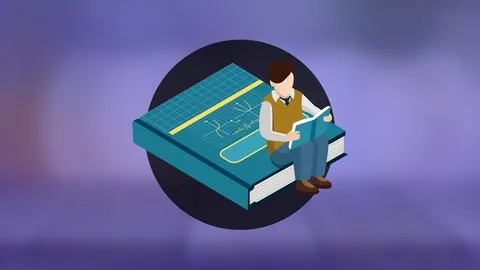
Essential Linear Algebra for Data Science 
This course provides an accessible introduction to Linear Algebra, the essential mathematics for a career in Data Science. With an emphasis on practical applications and avoiding unnecessary proofs and concepts, it is the perfect way to quickly gain the skills needed to pursue a career in Data Science. ▼
ADVERTISEMENT
Course Feature
![]() Cost:
Cost:
Free
![]() Provider:
Provider:
Coursera
![]() Certificate:
Certificate:
Paid Certification
![]() Language:
Language:
English
![]() Start Date:
Start Date:
29th May, 2023
Course Overview
❗The content presented here is sourced directly from Coursera platform. For comprehensive course details, including enrollment information, simply click on the 'Go to class' link on our website.
Updated in [March 06th, 2023]
This course, Essential Linear Algebra for Data Science, provides learners with the fundamental Linear Algebra concepts needed for a career in Data Science. The course is designed to be approachable and friendly, avoiding unnecessary proofs and concepts that may not be used. Upon completion of the course, learners will be prepared to successfully complete Statistical Modeling for Data Science Application, which is part of CU Boulder's Master of Science in Data Science (MS-DS) program.
[Applications]
Upon completion of this course, learners can apply the concepts of linear algebra to data science applications. They can use the knowledge gained to understand the fundamentals of linear algebra and apply them to data science problems. Learners can also use the skills acquired to develop and implement linear algebra models for data analysis and interpretation. Additionally, learners can use the concepts of linear algebra to develop and implement algorithms for data analysis and machine learning.
[Career Paths]
1. Data Scientist: Data Scientists are responsible for analyzing large datasets to uncover trends and insights. They use a variety of techniques, such as machine learning, statistical modeling, and data mining, to identify patterns and develop predictive models. Data Scientists are in high demand and the field is expected to continue to grow as more organizations rely on data-driven decision making.
2. Data Analyst: Data Analysts are responsible for collecting, organizing, and analyzing data to identify trends and insights. They use a variety of techniques, such as SQL, Excel, and Tableau, to extract and visualize data. Data Analysts are in high demand and the field is expected to continue to grow as more organizations rely on data-driven decision making.
3. Machine Learning Engineer: Machine Learning Engineers are responsible for developing and deploying machine learning models. They use a variety of techniques, such as deep learning, natural language processing, and reinforcement learning, to create models that can be used to make predictions and automate tasks. Machine Learning Engineers are in high demand and the field is expected to continue to grow as more organizations rely on automated decision making.
4. Business Intelligence Developer: Business Intelligence Developers are responsible for creating and maintaining data warehouses and data marts. They use a variety of techniques, such as ETL, SQL, and data modeling, to extract, transform, and load data into a data warehouse. Business Intelligence Developers are in high demand and the field is expected to continue to grow as more organizations rely on data-driven decision making.
[Education Paths]
1. Master of Science in Data Science (MS-DS): This degree program is designed to provide students with the skills and knowledge necessary to become successful data scientists. It covers topics such as data analysis, machine learning, and artificial intelligence. Students will learn how to use data to solve real-world problems and develop the skills to become a successful data scientist. The program also provides students with the opportunity to specialize in a particular area of data science, such as natural language processing or computer vision.
2. Master of Science in Applied Statistics: This degree program focuses on the application of statistical methods to solve real-world problems. Students will learn how to use statistical methods to analyze data and develop models to make predictions. They will also learn how to interpret and communicate the results of their analyses. This degree program is ideal for those who want to pursue a career in data science or analytics.
3. Master of Science in Machine Learning: This degree program focuses on the development of algorithms and techniques for machine learning. Students will learn how to design and implement machine learning algorithms and use them to solve real-world problems. They will also learn how to interpret and communicate the results of their analyses. This degree program is ideal for those who want to pursue a career in artificial intelligence or data science.
4. Master of Science in Artificial Intelligence: This degree program focuses on the development of algorithms and techniques for artificial intelligence. Students will learn how to design and implement AI algorithms and use them to solve real-world problems. They will also learn how to interpret and communicate the results of their analyses. This degree program is ideal for those who want to pursue a career in artificial intelligence or data science.
Pros & Cons

Wellintentioned instructor

Bitesize lessons

Good for revision

Easily explained

Great introduction for beginners

Just the right pace

Succinct

Phenomenal instructor

No connection to data science

No practical applications

No focus on higherlevel concepts

Not enough for thorough understanding

No applications of computations to data science
Course Provider

Provider Coursera's Stats at AZClass
Essential Linear Algebra for Data Science provides an introduction to linear algebra, the basic mathematics for a career in data science. With an emphasis on practical application and avoiding unnecessary proofs and concepts, it's the perfect way to quickly gain the skills you need for a career in data science. Learners can study a variety of topics from this course, including fundamentals of linear algebra, linear equations, matrices, vector spaces, linear transformations, and more. They will understand how linear algebra is used in data science and how it can be applied to solve real-world problems.
Discussion and Reviews
0.0 (Based on 0 reviews)
Explore Similar Online Courses

LCFA Exam Preparation

Value Creation and Building Enduring Relationships

Python for Informatics: Exploring Information

Social Network Analysis

Introduction to Systematic Review and Meta-Analysis

The Analytics Edge

DCO042 - Python For Informatics

Causal Diagrams: Draw Your Assumptions Before Your Conclusions

Whole genome sequencing of bacterial genomes - tools and applications

Algebra

Mathematics - Matrices


Start your review of Essential Linear Algebra for Data Science